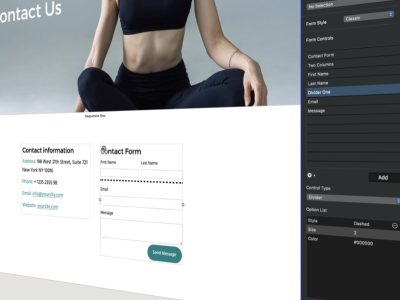When building your website in EverWeb you generally don’t need to worry about optimizing your site for search engines. EverWeb takes care of this automatically based on the information you have entered in the pages of your site and, primarily, the information you have entered in the Page Settings tab of the Inspector Window. This is very convenient if Search Engine Optimization (SEO) is not a primary concern for your site. However, if you are running a business, a site that provides information, or any site that that would benefit from a higher Internet search profile, SEO then becomes more important and something that you would need to focus on.
SEO for Beginners in EverWeb
You probably know that EverWeb includes a free SEO for EverWeb Video Course. It’s a great way to get a fast start on how to optimize our site for better Search Engine Results Pages (SERP). It’s a free course and steps you through SEO in short but easy to understand steps. No jargon and no magic! It’s great for SEO beginners or if you just need an SEO refresher as you can just jump in to the SEO feature that you want to work with. One of these options in Header Tags…
SEO, The Heading Tags Widget and HTML Tags
EverWeb’s Heading Tag widget was introduced back in EverWeb version 1.7 and lets you apply manual ‘tags’ to headings within the pages of your site. These tags are picked up by search engines to help optimize search engine results pages better. Heading Tags are just one ‘tool’ that search engines use to rank your pages for SERP. There are many other ways in which search engines work out page rankings.
Using EverWeb’s Heading Tags widget helps you manually tune your site’s pages for better SEO. You can assign up to six levels of heading using the widget. The levels are known as ‘h1’ through to ‘h6’. The h1 tag is usually applied to the title, or heading, of the page and is usually only used once per page. The next level down, h2, is used for sub-headings so you can have one, or more, of these on your page. Usually it’s best not to have too many h2 tags, but focus instead on those sub-headings that are going to be most important to your page’s SEO. The h3 tag is used for sub sub-headings and so on down to h6.
Where possible, and appropriate, you would usually try to include your main and secondary SEO keyword terms in the h1 and h2 tags respectively. It’s not essential to do so though. Your content should be your first priority at all times over and above your SEO and page rankings. It’s also advisable not to use Heading Tags h4-h6 as using these will have little or no impact on your SEO.
In versions of EverWeb before the recently released version 3.9, the only way to easily add h1-h6 Heading Tags to your pages was by dragging and dropping the Heading Tags widget on to the page, then adding the text you wanted to use for your heading in to the widget’s Widget Settings. You would then use the Fonts Panel and Color Picker to style your Heading Tags text.
Inline HTMLTags Settings
Now with EverWeb 3.9 there’s a simpler and quicker way of adding Heading Tags to your pages by using inline HTML Tags rather than using the Heading Tags widget. HTML Tags include Heading Tags h1-h6 plus ‘auto’ and ‘p’ options. Simply select the text that you want to use as a Heading Tag then go to the Text Inspector. At the bottom of the settings is the new ‘HTML Tags’ dropdown menu. Just select the tag level that you want to use for your selected text. That’s all you need to do!
If you are not concerned about SEO in your site, or would rather leave EverWeb to automatically apply Heading Tags when publishing your site, leave the field as ‘auto’. Use the ‘p’ tag when you want to indicate the importance of a particular paragraph to Search Engines, for example, this can be useful when the page contains a summary, or conclusion, type of paragraph.
When to Use EverWeb’s Inline HTML Tags
As with anything to do with SEO, use the available tools wisely. Remember, you don’t have to apply SEO to everything and you certainly don’t need to apply SEO to all of the pages in your site. Focus only on those pages that are the most important to you. So, for example, you probably won’t need to add SEO to your ‘About’ or ‘Contact’ pages. Most sites have these types of pages so adding SEO to yours will make no difference to your SERP rankings.
Using SEO intelligently, and sparingly, will benefit you more than smothering your site in SEO keyword terms and HTML Tags.
Supercharging Your SEO: EverWeb SEO PowerUp Addon
Adding HTMNL tags to your site is now simpler than ever and styling your headings takes no additional effort either. For those of you who rely on SEO though for their business, you can take SEO a step further by using EverWeb’s SEO PowerUp Addon. The addon allows you to customize your SEO on a page by page basis and you can add in your own keywords and the frequency and priority used by web crawling spiders.
EverWeb’s new inline HYML Tags make adding SEO to your titles, sub-headings and paragraphs in the pages of your site just that much easier, simpler and quicker to do!










Comments